.

Tramonto sull'Isonzo. Tramonto sul fiume Isonzo ripresa dell'isola della Cona:
photo by Teone! 2 March 2008
Versa il 20 maggio 1916
Il carnato del cielo
sveglia oasi
al nomade d'amore
.
Versa 20 May 1916
The sky's chaste flesh
.
Versa 20 May 1916
The sky's chaste flesh
awakens oases
in the nomad of love
Giuseppe Ungaretti (1888-1970): Tramonto (Sunset), from Il porto sepolto (The buried harbor), 1916; English by TC

Wounded at field hospital on the Isonzo: photographer unknown, for Bain News Service, c. 1915 (George Grantham Bain Collection, Prints and Photographs Division, Library of Congress)

Wounded at field hospital on the Isonzo: photographer unknown, for Bain News Service, c. 1915 (George Grantham Bain Collection, Prints and Photographs Division, Library of Congress)
I began Il porto sepolto
on the first day of my life in the trenches -- Christmas Day 1915. I
was in the Carso, on Mount San Michele. I spent those nights lying in
mud, opposite the enemy who was positioned higher than us and who was a
hundred times better armed. In the trenches, almost always in those same
trenches, because we stayed on San Michele even during the breaks --
the battles went on for a year. Il porto sepolto contains the experience of that year.
I was in the presence of death, in the presence of nature, of a nature that I learned to know in a new, terrible way. From that moment I became a man who makes war. It wasn't the idea of killing or being killed that tormented me: I was a man who wanted nothing for himself but relationship with the absolute, the absolute that was represented by death, not by danger, that was represented by the tragedy that brought man to meet himself in massacre. In my poetry there is no trace of hatred for the enemy, nor for anyone: there is the grip of consciousness of the human condition, of the fraternity of mankind in suffering, of the extreme precariousness of its condition. There is the will to expression, the necessity of expression, there is elation, in Porto sepolto, that almost savage elation of vital impulse, of the appetite for living, that is multiplied in the proximity and daily company of death. We live in contradiction...
Il porto sepolto
was printed in Udine in 1916, in edition of eighty copies edited by
Ettore Serra. It was entirely his fault. To tell the truth, those pieces
of paper -- postage-exempt postcards, margins of old newspapers, white
spaces in cherished letters I had received -- on which for two years,
day after day, I had been examining my conscience, sticking them
afterward helter-skelter into my knapsack, carrying them to live with me
in the mud of the trenches, or making myself a pillow out of them
during rare breaks, were not destined for any public. I had no idea of a
public, and I hadn't wanted the war and didn't participate in the war
to draw applause; I had, and I still have today, such respect for a
great sacrifice such as war is for a people, that every act of vanity in
that sort of circumstance would have seemed to me a desecration -- even
that of one one who, like us, found himself in the midst of the fray.
Also, I had set for myself an ideal so rigorous, and perhaps absurd, of
anonymity in a war destined to end, according to my hopes, with a
victory of the people, that anything that might in the slightest sense
have distinguished me from another foot soldier would have struck me as a
hateful privilege and an offense to the people to whom I had meant to
give a sign of complete dedication, accepting the war in that most
humble state.
This was the state of mind of the soldier who left that morning along the streets of Versa, carrying along his thoughts, when he was accosted by a lieutenant. I didn't have the courage not to confide in that young officer who asked me my name, and I told him that I had no other relief but to search for and find myself in some words, and that this was my way of making progress as a human being. Ettore Serra carried off my knapsack, put into order the scraps of paper, and brought to me one day, when we had finally taken San Michele, the proofs of my Porto sepolto.
Giuseppe Ungaretti, prefatory note to L'allegria (1931), translated by Andrew Frisardi in Giuseppe Ungaretti: Selected Poems, 2002
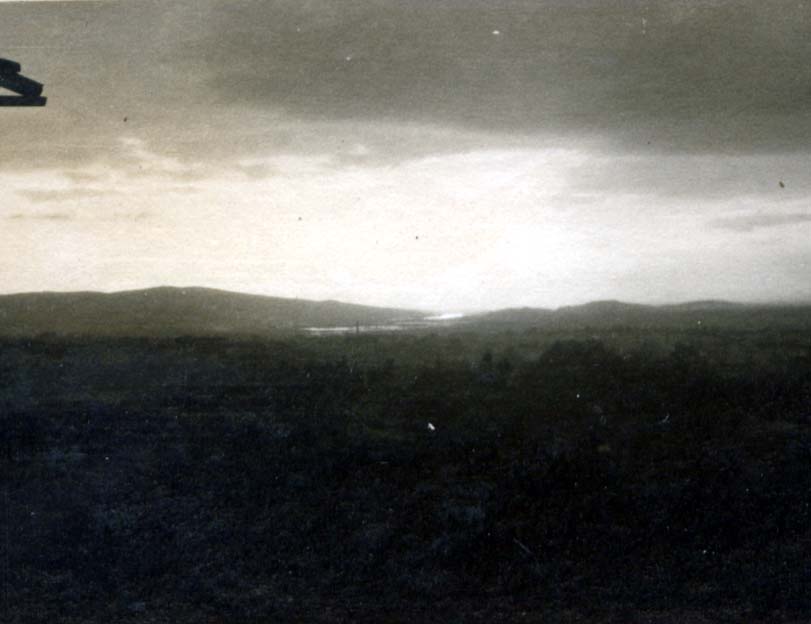
Autumn, 1916, Gorizia. Tramonto sull'Isonzo (Sunset on the Isonzo): photographer unknown; image by rvivanti, 20 April 2008
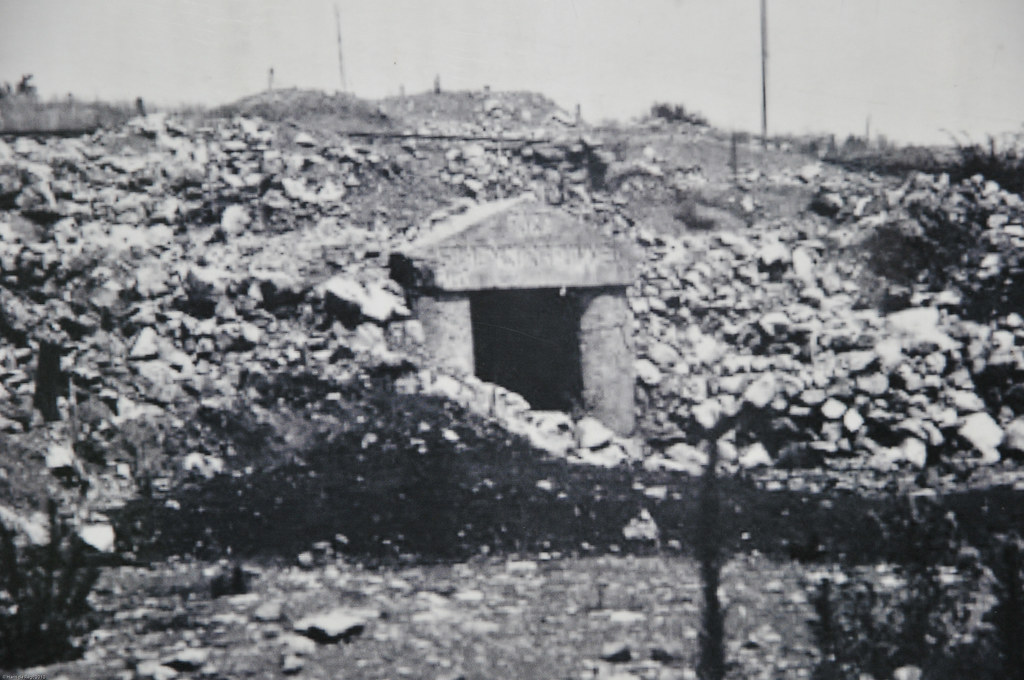
Entrance to the Schönburg tunnel, Monte San Michele: photographer unknown, February 1916; image by by Hans de Regt, 310 August 2010
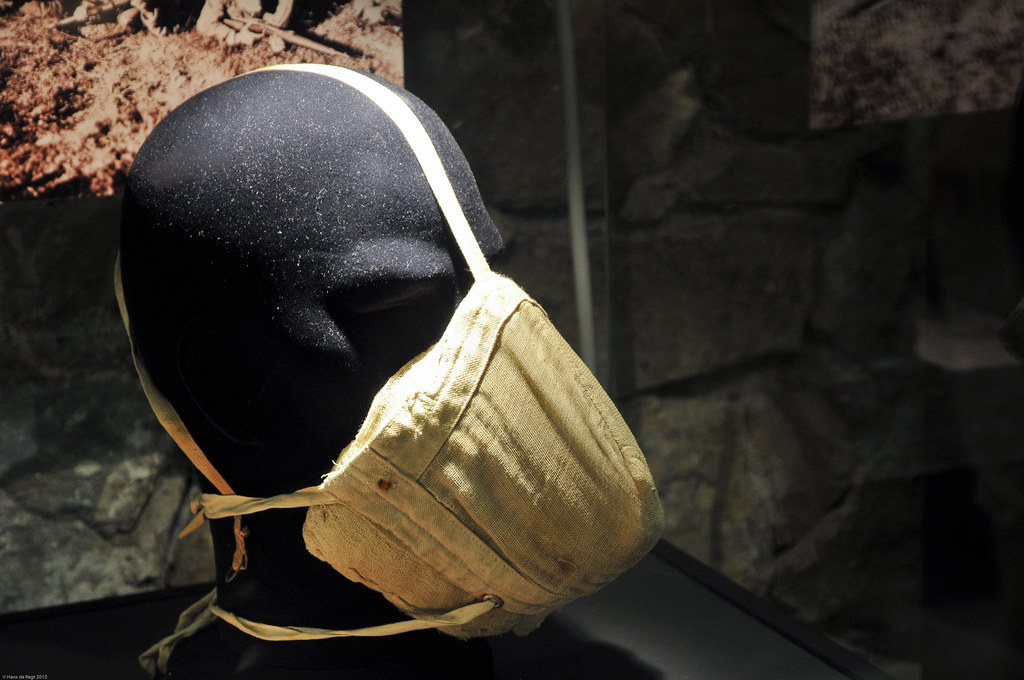
Early Italian gas mask from the 1915-1918 Battles of the Isonzo, Gorizia Museum. This single-purpose (monovolente) mask, called the Ciamician-Pisci type, had a conical shape. It was made of 10 layers of gauze saturated with an alkaline solution of sodium carbonate and potassium carbonate. To keep the alkaline solution from irritating the user's lips a strip of flannel protected the mouth. It, too, offered protection only against chlorine. It was a major cause of a disaster at Monte San Michele on the Carso which was abandoned when the Austrians attacked with phosgene gas: photo by Hans de Regt, 5 September 2010
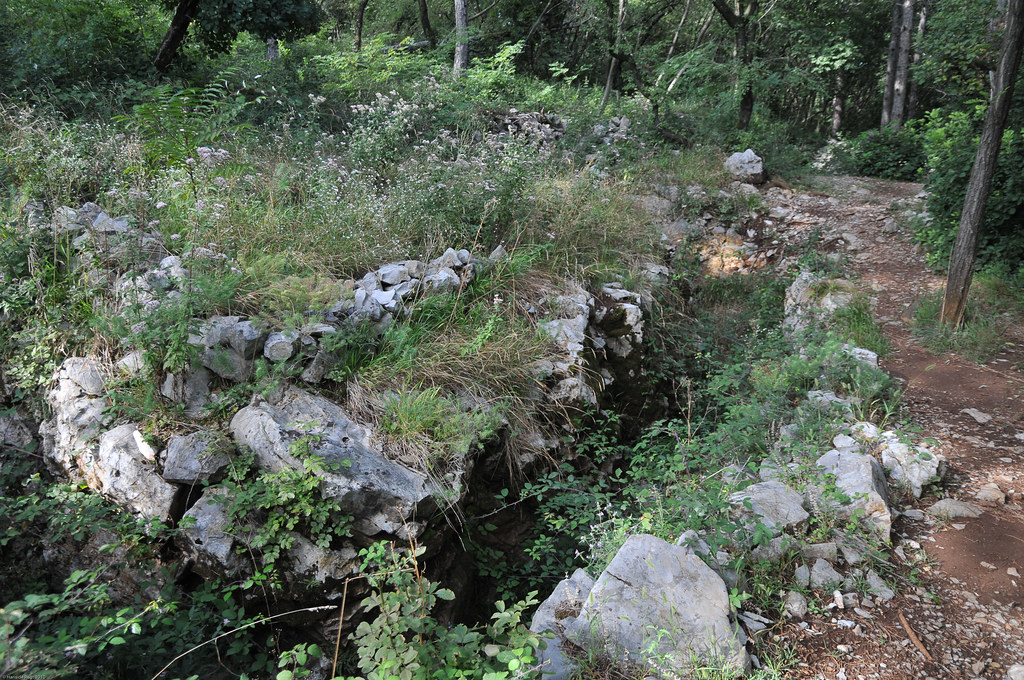
Old trenches from the 1915-1918 Battles of the Isonzo, Monte San Michele: photo by Hans de Regt, 31 August 2010
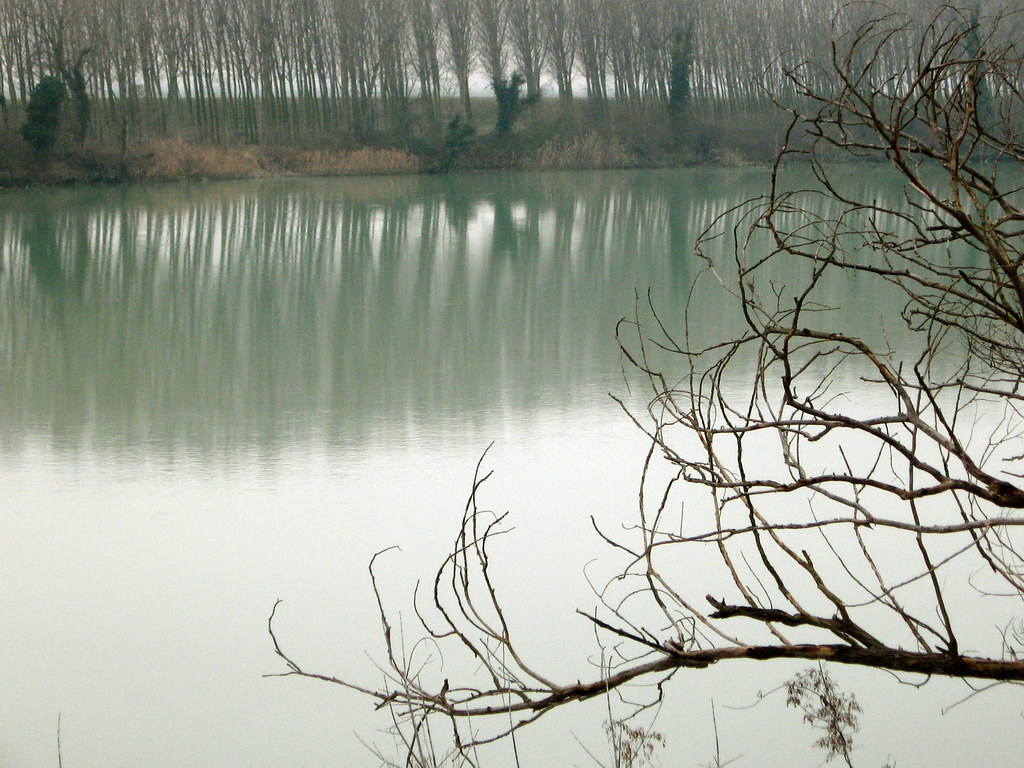
Reflessi sull'Isonzo. La tappa sul ponte sull'isonzo è staat turbolenta. Mentre mi fermavo a fare foto, le nacchine mi sfrecciavano vicino facendo rumore sulle giunture del ponte: photo by David e Paola, 20 January 2008
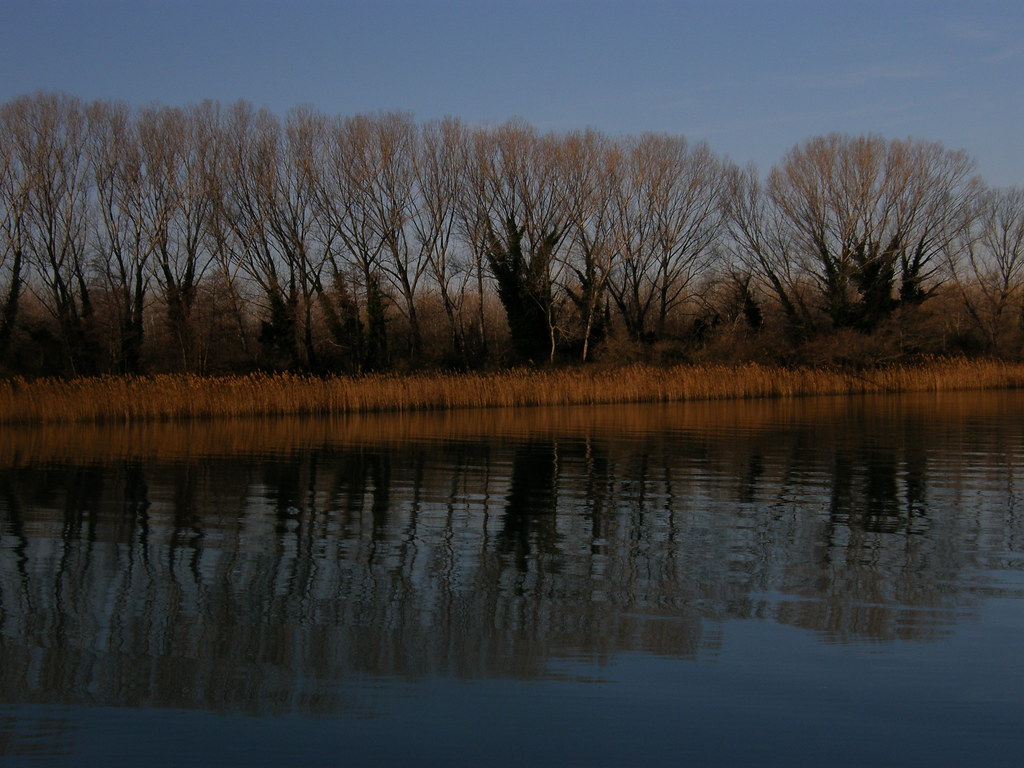
Isonzo dall'isola della Cone verso la strada per Grado. Gorizia, Friuli Venezia-Giulia, Italy: photo by SERGIO (giotto1959), 28 December 2007
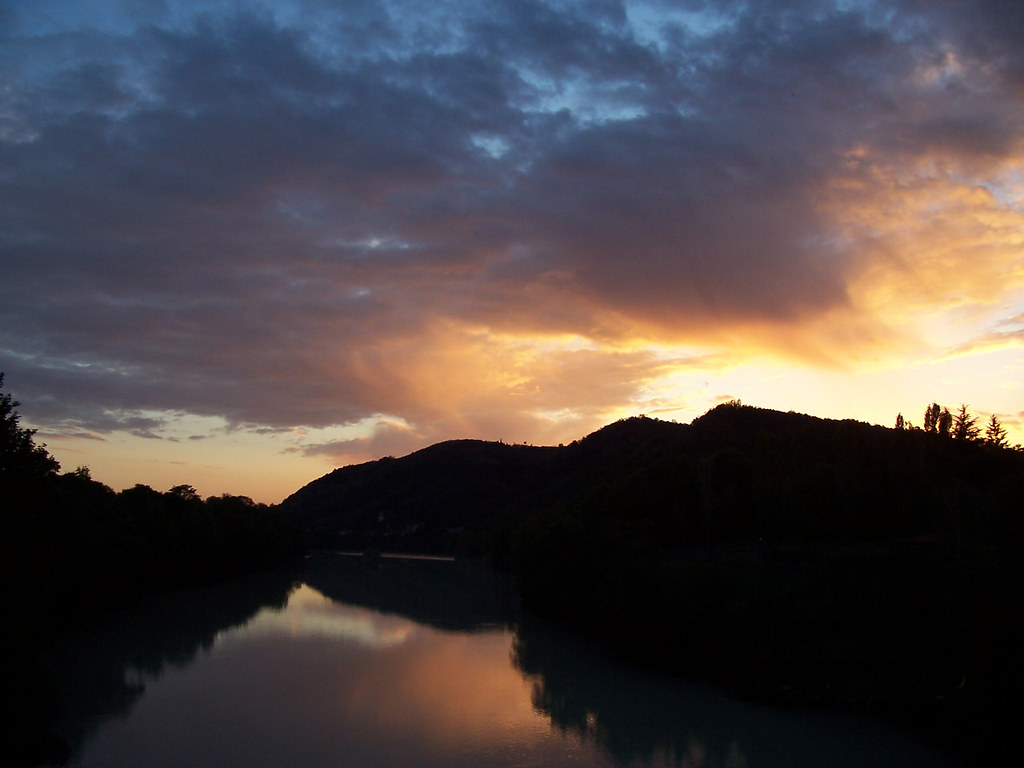
Tramonto sul fiume Isonzo: photo by waferwaffa, 5 October 2006



17 comments:
The Isonzo front, 1915-1918
Francesco Rosi: Uomini Contro (1970)
The sky's chaste flesh
In a world so wholly fucked it must be something to catch sight of such a sunset.
The Rosi clip: comical and inhuman.
try this recently produced WW l two-hours piece
especially interesting ( to me) the last hour...
from about the E.E.Cummings part and the Harlem Hell Fighters and the et ceteras:
http://www.youtube.com/watch?v=Pxb3j6Ps44c
(and ignore the stupid comments that are attached at the bottom....
Feeling quite a bit of pressure recently (and at the moment), at first I thought: "Why can't Tom just give us the beautiful three line poem and the upper photo? Why the rest of this, which looks quite depressing?" Then I read on and am very glad I did. I've been up for quite a while in a hotel room in Boston where we're visiting for the weekend -- some pre-college previewing for Jane and then a China adoption group reunion. I just finished reading a series of articles and a collection of pseudonymous (for that is the way) "comment sewer" entries from my own college newspaper regarding the latest series of discourtesies and inconveniences on campus. What a bunch of crybabies. God bless Ettore Serra. Curtis
Ungaretti's horrific, ecstatic war-poetry diary manages to capture its moments without respect to any possible tomorrows -- of which, in fact, it didn't appear there were going to be any.
The word-choices, in these exquisite small poems, deliver more weight than might have been expected. For example, the choice of "carnato" takes on all its invested meaning when one looks at the photo I've placed beneath the poem here.
A good few of them in the photos little more than boys.
The twentieth century had hardly begun when humans began to apply economies of scale to warfare and death. Mass murder had been a slow, labor-intensive process before then. At the battle of the Somme fifty thousand men could die in one day, and there were other days equally horrific. That’s not casualties, but killed. The wounded were another obscene number. We know that the wound is to the mind as well as the body. The horrors of this industrial slaughter are many, and the fact that it’s all calculated seems not the least of them . . . as in mathematicians who design munitions to explode with maximum lethality.
One day on the streets of St. Petersburg Ouspensky saw wagonloads of crutches that the Russian military was shipping to the front in 1914, in preparation for the mass maiming that was to come—and that rational minds had anticipated. He found a cynical efficiency in the planning and forethought given to carnage.
to say nothing of the 60,000 + body bags we sent over to Iraq.... remember that ?
you don't have to go all the way back to 1914.... just go back a few years....
http://www.boston.com/news/packages/iraq/globe_stories/012491_women.htm
hey... try this and some of the links:
http://antiwar.com/casualties/
what we-the-people get is just
"All the News that's Fit to Print" we care more about Miley Cyrus and her tiny tiddies than what counts !
"The horrors of this industrial slaughter..."
Of course, war has always been colossally good business -- apart from the necessary blood and guts, it's all machine-made, like that wrecking ball the poor undernourished Americanski girl puts her wee sad all into tonguing on her latest video.
But where is the enemy now, and what happens when the Rambling Wreck looks into the crack'd mirror and sees next Tuesday's office party in the Sheremetyevo transit lounge all done up in last year's burnt out Christmas lights?
Regarding your own last comment, I don't think that the Great Wreck spends a lot of time involved in meaningful self-reflection, either coming or going. I spent yesterday evening in the company of two people (sisters) I know pretty well. The older one holds an important position at one of the major financial institutions in New York. She doesn't make policy, per se, but her job is to ensure that their corporate ship of state sails evenly in all weather. The younger sister is a senior administrator at a good private school. They're as nice as can be, but embody what's derided these days as the "low information" mentality. I'm sure their jobs are highly involving and they're mothers of teenage girls (also highly involving and stressful), but they know absolutely nothing about anything. They wouldn't know or believe that the world ended unless someone told them that the NY Times had said so. Since newspapers are now out of style and going out of business, that would be an unlikely event. Curtis
Curtis, so now it can be revealed: all received opinion on the planet can be traced back to something somebody heard that somebody said in the New York Times.
(It can't be anybody actually reads the thing, I mean no, it's simply not possible.)
But speaking of wreck...
In my salad years (as they say) my most prized phonograph recording (78 rpm naturally) was an album of college football "fight songs". I was maybe six years old at the time of which I speak, and possessed of only an approximate understanding of the universe. (Well, nothing's changed much in that respect.) So I wasn't altogether sure exactly what "Georgia Tech" was, or what its students actually studied, or did, etc. But theirs was my hands-down favourite fight song of all time:
I'm a Rambling Wreck
From Georgia Tech
And a hell of an engineer...
I suppose I imagined the place as a sort of top-drawer railroading academy, which seemed perfectly sensible to me. I couldn't, at the time, think of anything more worthy of study. Than trains, that is. Nobody had yet informed me about girls.
Thank God Miley Cyrus did not yet exist back then.
Not to belabour the anecdote unduly but... as this is blogging, personal revelations are de rigueur, and so... what was it we were talking about, again?
pretty sooner or even maybe
later
we will all look back on this
as we-ALL be merely
...... wavelengths emanating ?
{ without (paper) newspapers
just
what will I use to get my wood-fire going
so's I can get warm, cook my beans and burn my 120,000 pieces of variuousnesses and sundries ?
and
now that there are no longer any telephone books
what paper will I use to practice my brush (sumo-e) work ?
I guess that it is an absolute advantage..... being ignored.
So here's the ticket, Ed -- when the goin' gets tough, just whistle "Ramblin' Wreck"...
wasn't that John Wayne movie
The High and the Mighty ?
as I recall
the theme song of the movie was good.
and
you can really tell that Wayne wasn't doing the whistling...
just like everything else he did..... after those 1930's cowboy movies
he ws phony-bologne !
while he was whistling Georgia Tech's 'fight' song
I was singing Georgia on My Mind with The Rayman
and
doing Red Sails in the Sunset with The Fat Man (Fats Domino)
Ed,
Darn right, and yeah, that crazy theme song -- is that what's known as iconic, or what?
The Whistler, there, I believe, was Victor Young, buoyed along (not) on Dmitri Tiomkin's rockin' beats.
Ah, weren't those the days of hot buttered popcorn spilt on the magical second-date lap in the religious darkness of the thyutuh?
Still... thinking on the meaning of the high and the mighty (what's that you say?), and what with the government doing its current brilliant imitation of a chicken laying an egg in an iron lung, it did occur to someone around here that maybe what the good old USA needs right now is what this particular legislative body seems to have had piped in directly to its august chambers: nitrous oxide.
"in the religious darkness of the thyutuh"
and yes. yes. yes.
and her name was Anita/Devi and she wore a pink fuzzy sweater and sweet-red lipstick and she was barely 16 and sweet and it didn't matter why mov i.e. was on the Queenstown Drive-In's screen and the erotic was NEVER vulgar
then
all poems and art are erotic and
it is the (in the darkk and in the light
the erotic love and innocence that makes life worth living....
then the awareness of
as
awareness and mind are not same thing ?
Post a Comment